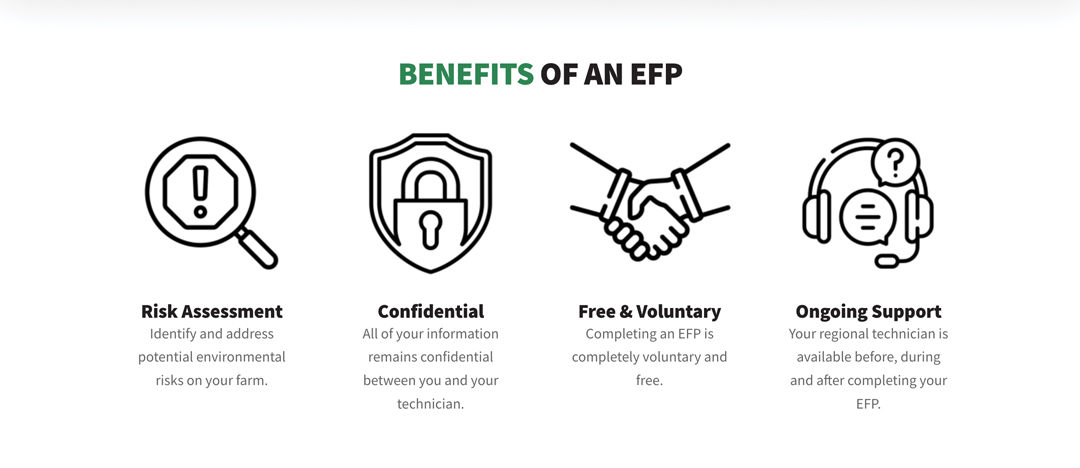EFP A-OK FOR RISK MANAGEMENT
BY EMILY R. JOHNSON • GRAPHIC COURTESY OF ALBERTA EFP
Starting in 2025, farmers with allowable net sales greater than $1 million must complete an agri-environmental risk assessment to receive funds from AgriInvest. A business risk management savings program of the Sustainable Canadian Agriculture Partnership (SCAP), government will match farmer contributions up to one per cent of their net sales. Though details are yet to be fully developed, according to Agriculture and Agri-Food Canada, an Environmental Farm Plan (EFP) can be used to meet the requirement.
The government intends the new requirement will encourage farmers to assess and plan for agri-environmental risks. Large farms are the focus, as they have the greatest potential to make positive environmental impacts at scale.
The Alberta EFP program is managed by the Agricultural Research and Extension Council of Alberta. It was launched in the early 2000s to assist farmers in the use of the EFP self-assessment tool. With it, a farmer can identify environmental risks and develop a mitigation plan.
According to Lisa Nadeau, the organization’s EFP program director, completion of an EFP or similar environmental risk assessment tool has several benefits. “Producers can assess and identify their farm’s environmental risk and come up with an action plan with the help of their assigned local technician,” said Nadeau. She said it provides education and awareness to help farmers effectively manage environmental risks and equips them to make informed decisions.
The organization’s online system makes the required EFP workbooks easy to maintain and update. Program participants are also granted access to more than 500 informational resources and programs that cover a wide range of topics including beneficial farm management practices and habitat management.
Through established farm management groups, such as Rahr Malting or Alberta Sugar Beet Growers, eligible farmers can also register for the EFP+, an upgraded version that scores farms on the Farm Sustainability Assessment created by SAI Platform, a global non-profit ag sustainability group. Although not required under AgriInvest, the EFP+ program is increasingly encouraged within the industry and may particularly benefit both malting barley farmers and maltsters.
Kevin Sich, Rahr Malting supply chain director, said the company was one of the first in Canada to encourage the use of EFP+. “In 2018, some of our brewing clients began asking, ‘Is this barley grown sustainably?’ Consumers became increasingly curious about where their food comes from.”
Completing an EFP+ provides a significant market access advantage, said Sich. “If they’re giving us a product we can trace back to their farm and they can provide documentation for, we have market access to Japan or a major craft brewer in the U.S. that we might normally not be able to sell into.”
The EFP and EFP+ contribute to the sustainability and resilience of Alberta’s ag industry, said Sich. “It lifts the whole agriculture community, and it’s a great story to tell: ‘I’m a century farm, my grandfather homesteaded here a hundred years ago, plus we have an EFP that we scored gold in.’ That’s pretty impressive, and that story needs to get out to the urban population.”
Nadeau emphasized the EFP and EFP+ share the goal of continuous improvement. “With the EFP+ program, producers revisit their developed environmental action plans every three years to check in on their progress in a supportive way. Local and global markets recognize that progress.”
For more information, visit albertaefp.com.







Comments